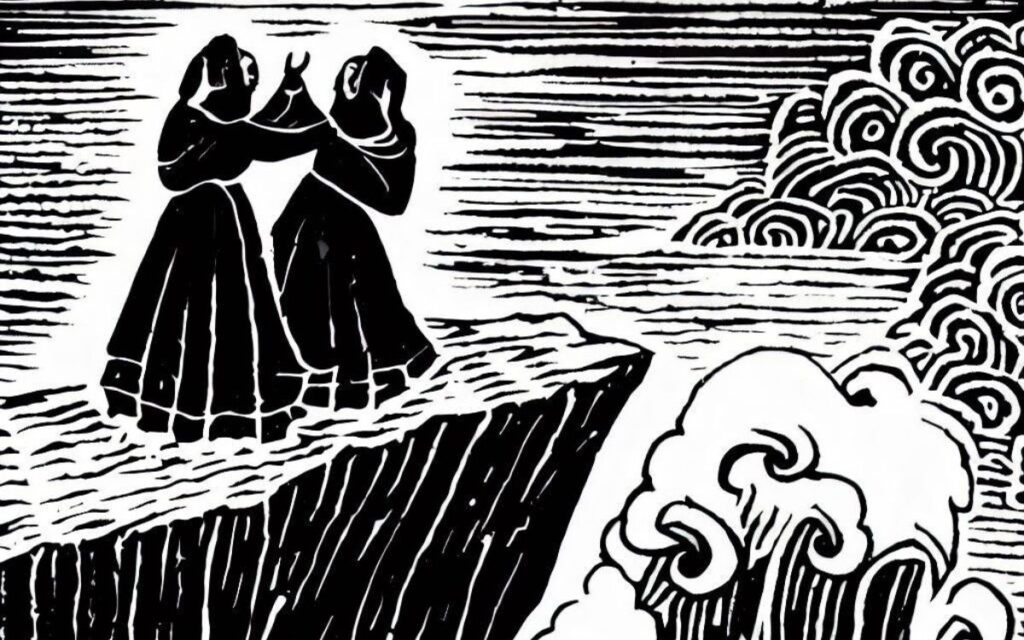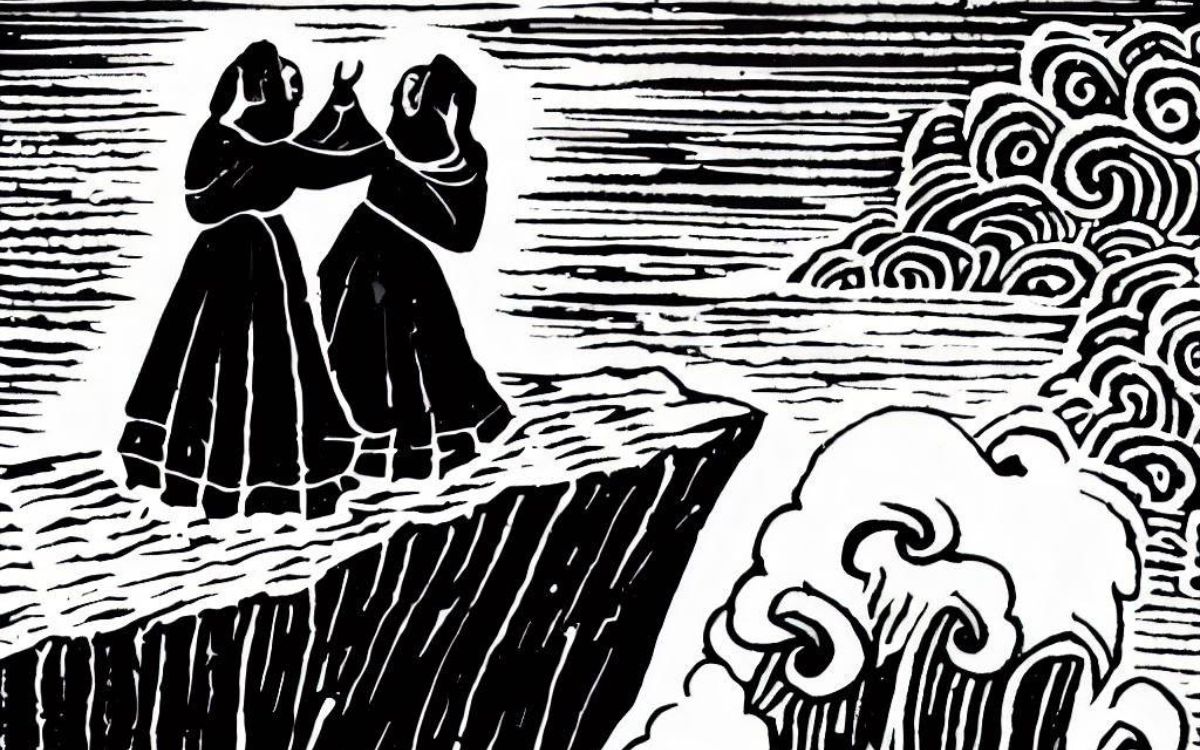Binnorie (The Twa Sisters) is a chilling Scottish ballad weaves a tale of jealousy, betrayal, and supernatural justice, captivating listeners for centuries

Few songs weave a tale as chilling and enthralling as Binnorie O Binnorie.
This ancient Scottish ballad, steeped in jealousy, betrayal, and eerie retribution, has haunted listeners for centuries.
Known also as The Two Sisters or The Cruel Sister, it feels like a whispered secret passed through generations, its sinister story spreading far beyond the borders of Scotland to England, Scandinavia, and America.
First printed in 1656 as The Miller and the King’s Daughter, Binnorie reaches deep into the shadows of folklore. Its roots lie somewhere along the misty Anglo-Scottish border, a region known for its brooding tales of love and treachery.
Over time, the ballad splintered into countless variations, its verses evolving but its essence remaining darkly intact.
Folklorists like Francis J. Child and Cecil Sharp sought to capture this elusive song, collecting versions from rural villages and remote homesteads. Each rendition carried a ghostly echo of the original, keeping its unsettling magic alive.
Among the most notable versions is one sung by John Strachan, a farmer from Aberdeenshire. Recorded in the 1950s, his telling strips away the magical ending found in other variants, but the sinister undertones linger, casting a shadow over the listener’s imagination.
The Sinister Tale
The story unfolds with two sisters walking by a body of water.
The elder, dark-haired and consumed by envy, turns on her fair-haired sibling, driven by a poisonous jealousy over a suitor.
In a chilling act of betrayal, she drowns her sister, watching as the water claims her. The imagery is stark and unnerving: the river, a silent accomplice; the fair sister, a victim of beauty and love.
But the tale’s true horror lies in what follows.
In many versions, the younger sister’s body is found by a wandering harper or miller.
From her bones, a harp or fiddle is crafted, its strings made from her golden hair.
The instrument—imbued with the spirit of the murdered girl – sings of her fate, its mournful melody exposing the crime and confronting the killer. The harrowing twist of supernatural justice makes the song linger in the mind, a spectral echo of the drowned sister’s sorrow.
The themes of Binnorie resonate far beyond Scotland.
Across Scandinavia, the ballad takes on even darker shades. The elder sister is likened to soot, the younger to sunlight.
In one Danish version, the murder is framed as a twisted ritual of cleansing, the water meant to purify but instead becoming an executioner.
In Ukraine, a yellow shawl – both a gift and a symbol of betrayal – is offered to the drowning girl, a final mockery from the killer.
The ballad’s supernatural elements amplify its spookiness. The transformation of a murdered body into a singing instrument is deeply unsettling, blending beauty with horror.
This is not just a tale of jealousy but of voices that refuse to be silenced, justice that rises from the depths, and secrets that demand to be heard.
Binnorie has inspired countless retellings, from the pre-Raphaelite fascination with tragic maidens to the eerie melodies of modern musicians.
Loreena McKennitt’s The Bonny Swans breathes new life into the tale, its haunting refrain echoing the ghostly harp. Pentangle’s Cruel Sister and the pagan-folk rendition Harp of Death by Omnia delve deeper into the story’s sinister heart, letting the darkness take centre stage.
Even beyond music, the tale casts its spell. The ballad’s imagery – golden hair, white bones, dark waters – evokes a Gothic aesthetic that has inspired artists and writers for centuries. Its echoes can be found in tales of spectral revenge, magical transformations, and the chilling consequences of envy.
The next time you hear its eerie strains, let yourself be pulled under its spell. Like the fair sister’s golden hair or the harp that sings of murder, Binnorie is a tale that refuses to sink, its haunting spirit rising again and again to whisper its chilling truth.
Lyrics of Binnorie (The Twa Sisters)
There were twa sisters sat in a bow’r
Binnorie, o binnorie
There cam a knight to be their wooer
By the bonnie mill-dams of Binnorie
He courted the eldest wi’ glove and ring
But he lo’ed the youngest aboon a’thing
He coorted the eldest wi’ broach and knife
But he lo’ed the youngest aboon his life
The eldest she was vexed sair
And sore envied her sister fair
The eldest said to the youngest ane:
“Will you go and see our father’s ships come in?”
She’s ta’en her by the lily hand
And led her down to the river strand.
The youngest stude upon a stane
The eldest cam’ and pushed her in.
She took her by her middle sma’
And dashed her bonny back to the jaw
“Oh sister, sister reach your hand
And ye shall be heir of half my land”
“Oh sister, sister reach your hand
And ye shall be heir of half my land
Shame fa’ the hand that I should take
It’s twined me, and my world’s make”
“Oh sister, reach me but your glove
And sweet William shall be your love
Sink on, nor hope for hand or glove
And sweet William shall better be my love”
“Your cherry cheeks and your yellow hair
Garr’d me gang maiden ever mair”
Sometimes she sunk, sometimes she swam
Until she cam to the miller’s dam
The miller’s daughter was baking bread
And gaed for water as she had need.
“O father, father, draw your dam!
There’s either a mermaid or a milk-white swan”
The miller hasted and drew his dam
And there he found a drown’d woman
Ye couldna see her yellow hair
For gowd and pearls that were sae rare
Ye coldna see her middle sma’
Her gowden girdle was sae braw
Ye couldna see her lily feet
Her gowden fringes were sae deep
A famous harper passing by
The sweet pale face he chanced to spy
And when he looked that lady on
He sighed, and made a heavy moan
“Sair will they be, whate’er they be
The hearts that live to beat for thee”
He made a harp o’ her breastbone
Whose sounds would melt a heart of stone
The strings he framed of her yellow hair
Their notes made sad the listening ear
He brought it to her father’s ha’
There was the court assembled there
He layed the harp upon a stane
And straight it began to play alane
“O yonder sits my father the King
And yonder sits my mother, the Queen”
“And yonder stands my brother Hugh
And by him, my William, sweet and true”
But the last tune that the harp played then
Was: “Woe to my sister, false Helen”
Tell us your thoughts on Binnorie (The Twa Sisters), in the comments below!



